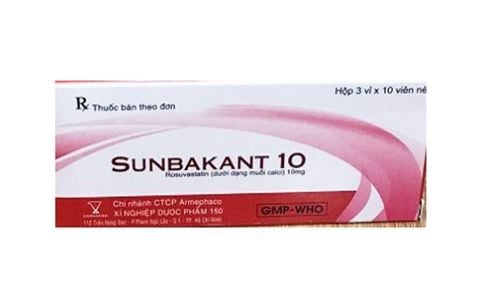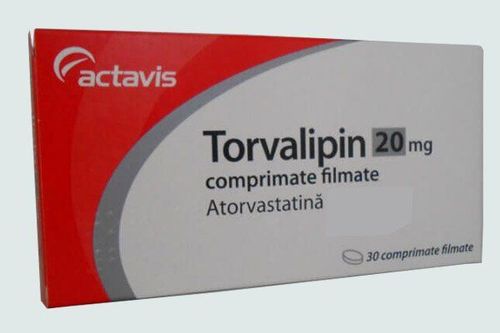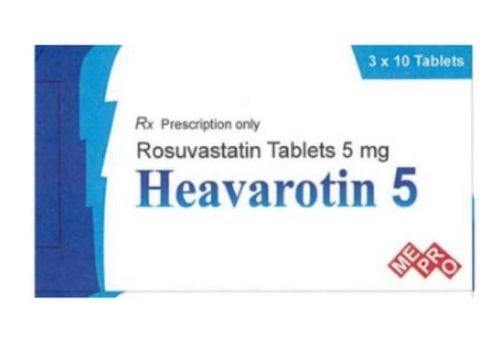This is an automatically translated article.
Atobe is made in the form of tablets, containing Atorvastatin and Ezetimibe. The drug works to improve blood cholesterol, used in the treatment of hypercholesterolemia and coronary artery disease.
1. Uses of Atobe
What is Atobe? The main ingredient of the drug is Atorvastatin 10mg + Ezetimibe 10mg.
Indications for the use of Atobe:
Treatment of hypercholesterolemia: Reducing low molecular weight cholesterol, increasing high molecular weight cholesterol; Treatment of coronary artery disease in patients with coronary artery disease associated with hypercholesterolemia, helps reduce the risk of myocardial infarction, reduces the risk of having to perform myocardial revascularization procedures, and reduces the risk of coronary artery disease. new lesions and reduce the risk of coronary death. Contraindications to the use of Atobe:
People who are sensitive or allergic to the ingredients of the drug; Patients with active liver disease or persistent unexplained elevations in serum transaminases; Pregnant women, women of childbearing potential or nursing mothers; Children.
2. Usage and dosage of Atobe
Usage: Orally. Patients can take the drug at any time of the day without paying attention to meals.
Dosage:
Hypercholesterolemia (heterozygous familial, not familial) and dyslipidemia: The starting dose is 10-20mg/time/day. For patients who need a significant reduction in LDL (more than 45%), a dose of 40 mg/time/day may be initiated. The therapeutic dose range of the drug is 10 - 80mg / time / day. After starting treatment or after increasing the dose of Atorvastatin, blood lipids should be assessed within 2-4 weeks to adjust the dose accordingly; Homozygous familial hypercholesterolemia: Use dose 10 - 80mg/time/day. Patients should use in combination with lipid-lowering measures; Combination therapy: Atorvastatin can be combined with resin to increase the therapeutic effect; Patients with renal impairment: No dose adjustment is required. Missed dose: If you forget to take a dose of Atobe, you should take it as soon as you remember. If it is almost time for your next dose, skip the missed dose and take your next dose as scheduled.
Overdose: When taking an overdose of Atobe, the patient should immediately notify the treating doctor and immediately hospitalized for timely intervention.
3. Side effects of Atobe
When using Atobe, patients may experience some side effects such as:
Mild side effects: Depression, headache, dizziness, joint pain, back pain, muscle pain, numbness or cold tingling sensations, shortness of breath, slow heart rate, erectile dysfunction, numbness or tingling in hands or feet, leg cramps, constipation, diarrhea, nausea, indigestion, heartburn, taste changes, insomnia , cold symptoms (sneezing, sore throat, stuffy nose); Serious side effects: Skin rash, increased erythema (may be accompanied by circular lesions), persistent abdominal pain with nausea and vomiting, joint pain, easy bleeding or bruising, yellow eyes, jaundice, dark urine, persistent cough, trouble breathing, fever, fatigue, or unexplained weight loss; Very serious side effects requiring immediate hospitalization: unexplained pain and weakness (rare, possibly progressing to kidney failure), chest tightness, swelling of the face - lips - tongue - throat (cause difficulty breathing or swallowing), sudden severe headache (may be accompanied by loss of sensation, nausea, body tingling, ringing in the ears), bleeding from the lips - nose - eyes mouth - genitals, ... When experiencing side effects of Atobe, patients should immediately notify their doctor to receive advice and appropriate treatment.
4. Be careful when using Atobe
Some notes for patients to remember before and during the use of Atobe:
Use of lipid-lowering drugs is only an intervention in risk factors in patients with increased risk of atherosclerosis due to hypercholesterolemia; Lipid-lowering drugs should be used together with a low-cholesterol, low-saturated fat diet; use drugs only when inadequate response to nutrition and other non-pharmacological measures; Before treatment with Atorvastatin, it is necessary to rule out secondary causes of elevated cholesterol such as hypothyroidism, renal failure syndrome, uncontrolled diabetes, dysproteinemia, alcoholism, obstructive liver disease, etc. .. and blood lipids should be checked; Liver function tests should be performed prior to treatment with Atobe. At the same time, in the process of using the drug, the patient also needs to be regularly monitored for liver function; Atobe should be used with caution in patients with alcoholism, heavy drinking and a history of liver disease; Patients should be warned about the risk of muscle problems such as muscle weakness, muscle tension or unexplained muscle pain with the use of Atobe; Do not use Atobe in pregnant and lactating women, if pregnancy is detected, discontinue the drug and consult a doctor. Breast-feeding women, if they must take the drug, should stop breast-feeding; Atobe can cause headaches, dizziness, insomnia, blurred vision,... so caution should be exercised in driving or operating machinery.
5. Atobe drug interactions
Some drug interactions of Atobe include:
Caution when combining Atorvastatin (the main ingredient of Atobe) with niacin or other immunosuppressive drugs; Increased risk of muscle damage with concomitant use of Atorvastatin with Cyclosporin, Gemfibrozil and other fibrate-lowering agents, Erythromycin, azole antifungals, high doses of Niacin (over 1g/day), Colchicin; Concomitant use of Atorvastatin with hepatitis C and HIV drugs may increase the risk of muscle damage, most seriously rhabdomyolysis and kidney failure, leading to kidney failure, which can be fatal. ; Concomitant administration of Atorvastatin with CYP3A4 inhibitors may increase the risk of myopathy and myopathy; When atorvastatin is used concomitantly with amiodarone, do not exceed 20 mg of Atorvastatin/day because of the increased risk of rhabdomyolysis. For patients who have to take a dose of more than 20m/day to achieve a therapeutic effect, the doctor may prescribe a statin drug such as pravastatin; Atorvastatin slightly increases the anticoagulant effect of coumarin. In patients receiving coumarin anticoagulants, prothrombin time should be assessed before and during treatment with Atorvastatin; Concomitant administration of Atorvastatin with antacid suspensions containing magnesium and aluminum hydroxide resulted in a reduction of plasma concentrations of Atorvastatin by approximately 35%. However, the low-molecular-weight cholesterol-lowering effect remained unchanged; When Atorvastatin is used concurrently with colestipol, concentrations of Atorvastatin are reduced by approximately 25%. However, the simultaneous use of these two drugs will increase the effect on lipids (compared to using only one drug alone); When multiple doses of Digoxin and 10 mg of Atorvastatin were administered concurrently, plasma digoxin concentrations were not affected. When digoxin was administered with 80 mg of Atorvastatin daily, digoxin concentrations were increased by approximately 20%. Therefore, appropriate monitoring is required in patients receiving digoxin; Co-administration of Atorvastatin with erythromycin (500mg x 4 times/day) or clarithromycin (500mg x 2 times/day) increases plasma concentrations of Atorvastatin; Co-administration of Atorvastatin and terfenadine had no clinically significant effect on the pharmacokinetics of terfenadine; Concomitant use of Atorvastatin with oral contraceptives containing norethindrone and ethinyl estradiol increases the concentration of norethindrone and ethinyl estradiol; Atorvastatin may increase the effects of warfarin; Simultaneous use of Ezetimibe (the main ingredient of Atobe) and Colestyramine reduces the concentration of Ezetimibe in plasma, so it is best not to use these two drugs at the same time; Cyclosporin may increase the plasma concentration of Ezetimibe, so careful monitoring is recommended in patients receiving these two drugs concomitantly. Ezetimibe efficacy may be greater in patients with severe renal impairment. Before and during treatment with Atobe, patients should have a reasonable diet, strictly follow the doctor's instructions on how to use and dose the drug. As a result, the drug will effectively control blood cholesterol better, preventing many dangerous diseases.
Please dial HOTLINE for more information or register for an appointment HERE. Download MyVinmec app to make appointments faster and to manage your bookings easily.













